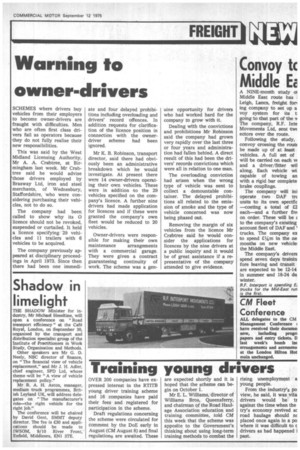Warning to owner-drivers
Page 23

If you've noticed an error in this article please click here to report it so we can fix it.
SCHEMES where drivers buy vehicles from their employers to become owner-drivers are fraught with difficulties. Men who are often first class drivers fail as operators because they do not fully realise their new responsibilities.
This was said by the West Midland Licensing Authority, Mr A. A. Crabtree, at Birmingham last week. Mr Crabtree said he would advise those drivers employed by Brasway Ltd, iron and steel merchants, of Wednesbury, Staffordshire, who were considering purchasing their vehicles, not to do so.
The company had been called to show why its 0 licence should not he revoked, suspended or curtailed. It held a licence specifying 29 vehicles and 11 trailers with 6 vehicles to be acquired.
The company previously appeared at disciplinary proceedings in April 1973. Since then there had been one immedi ate and four delayed prohibitions including overloading and drivers' record offences. In addition requests for clarification of the licence position in connection with the ownerdriver scheme had been ignored.
Mr K. B. Robinson, transport director, said there had obviously been an administrative breakdown which he would investigate. At present there were 14 owner-drivers operating their own vehicles. These were in .addition to the 29 vehicles specified on the company's licence. A further nine drivers had made application for licences and if these were granted the company's own fleet would be reduced to 20 vehicles.
Owner-drivers were responsible for making their own maintenance arrangements with a commercial garage. They were given a contract guaranteeing continuity of work. The scheme was a gen uine opportunity for drivers who had worked hard for the company to grow with it.
Dealing with the convictions and prohibitions Mr Robinson said the company had grown very rapidly over the last three or four years and administration had fallen behind. A direct result of this had been the drivers' records convictions which were all in relation to one man.
The overloading conviction had arisen when the wrong type of vehicle was sent to collect a demountable container. The delayed prohibitions all related to the emission of smoke and the type of vehicle concerned was now being phased out.
Removing the margin of six vehicles from the licence Mr Crabtree said :he would consider the applications for licences by the nine drivers at a public inquiry and it would be of great assistance if a representative of the company attended to give evidence.
















































































































